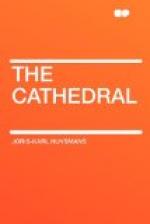This would seem incredible if it were not proved by authentic documents and undoubted evidence.
We possess letters of the period preserved in the Benedictine annals, a letter from an Abbot of Saint-Pierre-sur-Dive, found by Monsieur Leopold Delisle, in MS. 929 of the French collection in the Bibliotheque Nationale, and a Latin volume of the Miracles of Our Lady, discovered in the Vatican Library, and translated into French by Jehan le Marchant, a poet of the thirteenth century. And these all relate the way in which the Sanctuary dedicated to the Virgin was rebuilt after destruction by fire.
What then occurred was indeed sublime. This was a crusade, if ever there was one. It was here no question of snatching the Holy Sepulchre from the power of the infidels, of meeting armies on the field of battle, and fighting with men; the Lord Himself was to be attacked in His entrenchments, Heaven was besieged, and conquered by love and repentance! And Heaven confessed itself beaten; the angels smiled and yielded; God capitulated, and in the gladness of defeat He threw open the treasury of His grace to be plundered of men.
Then, under the guidance of the Spirit, came a battle in every workshop with brute matter, the struggle of a nation vowing, cost what it might, to save a Virgin, homeless now as on the day when Her Son was born.
The manger of Bethlehem was a mere heap of cinders. Mary would be left to wander, lashed by bitter winds, across the icy plains of La Beauce. Should the same tale be repeated, twelve hundred years later, of pitiless households, inhospitable inns, and crowded rooms?
Madonna was loved then in France—loved as a natural parent, a real mother. On hearing that she was turned adrift by fire, seeking woefully for a home, everyone grieved and wept; and that, not only in the country about Chartres; in the Orleans country, in Normandy, Brittany, the Ile de France, in the far north, whole populations stopped their regular work, left their homes to fly to Her help, the rich giving money and jewels, and helping the poor to drag their barrows and carry corn and oil, wine, wood and lime, everything that could serve to feed labouring men or help in building a church.
It was a constant stream of immigration, the spontaneous exodus of a people. Every road was crowded with pilgrims, all, men and women alike, dragging whole trees, pushing loads of sawn beams, and cartfuls of the moaning sick and aged forming the sacred phalanx, the veterans of suffering, the unconquerable legions of sorrow, all to help in the siege of the heavenly Jerusalem, forming the outer guard to support the attack by the reinforcement of prayer.
Nothing—neither sloughs, nor bogs, nor pathless forests, nor fordless rivers, could check the advancing tide of the marching throng; and one morning, from every point of the compass, lo! they took possession of Chartres.
The investment began; while the sick opened the first parallels of prayer, the sound pitched the tents; the camp extended for leagues on all sides; tapers were kept burning on the carts, and at night La Beauce was a champaign of stars.




